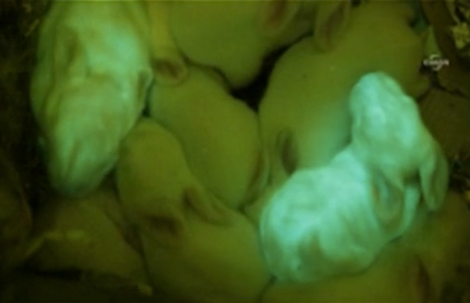Psst! Wanna see a bunny crossed with a glowstick? Sounds cool, right? (At least if you’re a raver and rabbit fan.)

What is going on? Is this some Animorphs fan fic come to life? WILL THE ’90S NEVER DIE?! The Atlantic quells your fears:
The transgenic bunnies were born last week. They are expected to live long, productive rabbit lives. They are not evil; they just glow bright green under a black light. They do not portend apocalypse, but rather a potential for great good.
The rational explanation for these neon green bunnies is that, as embryos, they were injected with jellyfish DNA, making them glow under a black light to signify successful assimilation of foreign genetic material. Reportedly, being about to tweak animal DNA means prescription drugs could get way cheaper (and we could start seeing a lot more radioactive-looking animals). Best-case scenario? A cure for HIV and other diseases.
The freak-the-hell-out explanation says HEY, isn’t it a little bit sketchy that lead scientist Stefan Moisyadi took the experiments overseas, where he doesn’t have to work with an ethics board or comply with the Animal Welfare Act? (As Moisyadi told Honolulu Civil Beat, “Animals have so many rights now that it is insane.” Sorr-yyyy.) PETA, needless to say, isn’t happy (then again, that’s probably a vote for the opposition) despite reassurance from the researchers:
Moisyadi et al. don’t have reason to suspect that their rabbits are harmed by the experimentation. “They live just as long as normal animals do. I can tell you from the mice [which have since been conducted at places like Caltech] they show no ill effects.”
If you’re skeptical of GMOs, GMFs (genetically modified furries) seem creepy too, although they aren’t going in our burritos. How much is too much when you’re fucking with nature? Alta Charo, law and bioethics professor at the University of Wisconsin-Madison, had some calming words:
There’s a commonly held, instinctive distrust of things that alter existing species even if it’s done for a good purpose. Personally, I think it’s something that is based on a fundamental misunderstanding of biology, premised on the belief that species are distinct and permanent. And in fact, species are not as distinct from one another as we think.
A cure for HIV is something we can all get behind. That the methods involve spawning the love child of a nightlight and Peter Cottontail is a bit unnerving.


